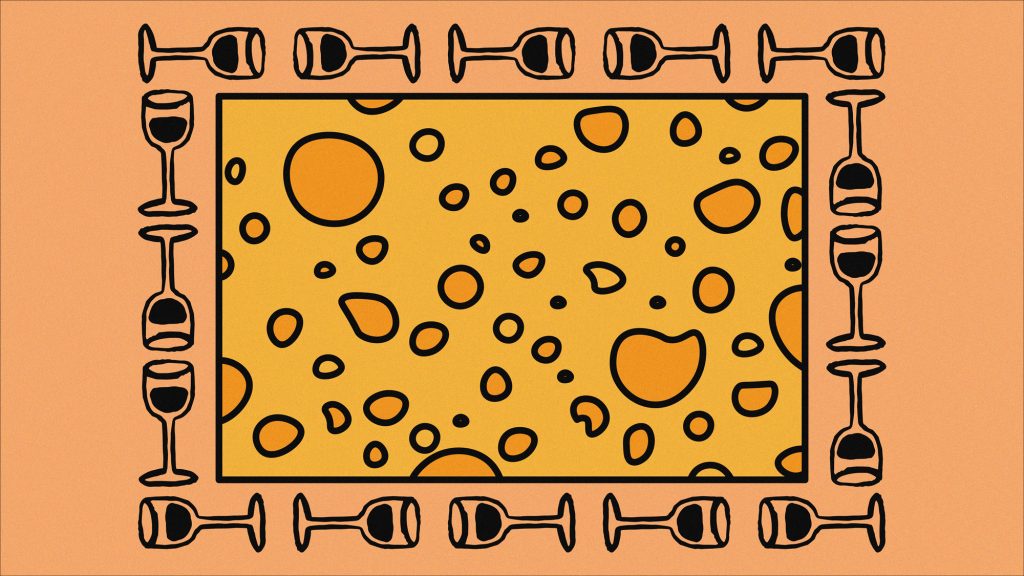Cookies and milk, burgers and beers, cheese and wine. Many food and drink pairings are timeless for a reason. Sure, we can get technical on why these flavor combos work so well, but in layman’s terms, they just hit every time.
The only downside to such classic duos is that they tend not to rank high on the nutrition scale — they nourish the soul, if not the body. While there’s no escaping the calories that come with these indulgences, a scientific study from 2023 did give wine and cheese lovers a reason to keep snacking on Camembert and Parm while the Cab and Chianti are flowing.
That’s right. As if the combo weren’t good enough to begin with, there’s a recently discovered silver lining. According to a study published in the September 2023 issue of the Journal of Functional Foods, probiotics found in certain cheeses can not only alleviate hangovers, but they can also help prevent alcohol-induced liver damage.
Alcohol, Enzymes, and the Liver
Alcoholic liver disease stems from tissue injuries in the organ, which is believed to be caused by acetaldehyde — a toxic chemical compound — converted from alcohol. When our bodies metabolize alcohol, alcohol dehydrogenase enzymes convert booze into acetaldehyde, and eventually into acetic acid. Therefore, anything that improves the metabolization of alcohol helps keep the liver healthy and reduces the severity of hangovers. That’s where certain probiotics come in, as some naturally break down acetaldehyde. While they can be found in many foods, cheese is a phenomenal vehicle for probiotics due to its ability to withstand the highly acidic conditions of the GI tract.
In the 2023 study, researchers in South Korea extracted two probiotic bacterias, Lactococcus lactis and Lactobacillus plantarum, from cheese and kimchi. The former bacteria is used in the production of cheddar, Brie, Camembert, Gruyère, Parmesan, and Roquefort while the other can be found in Stilton, feta, goat cheese, and a handful of other cheeses. For consistency, the researchers used the isolated bacterias to make probiotic cheese curds.
The Experiment
The scientists then split 20 rats into four groups. They fed the first group the probiotic cheese curds. The second group got cheese curds sans probiotics, and the other two got no curds at all. Shortly after, the researchers fed the first three groups a 25 percent ethanol solution, while the last group (labeled in the study as “normal”) received a saline solution.
Over the following 24 hours, the team intermittently tested the rats’ blood for alcohol levels, concentrations of toxic acetaldehyde compounds, and levels of select enzymes that ameliorate alcohol metabolism. After that, the rats were euthanized, and their livers were examined via microscope to assess inflammatory cell infiltration, the formation of fat vacuoles, and irregular liver cell arrangements.
Gimme the Cheese, Please
While the first three groups had all consumed the same amount of alcohol, the researchers found that the rats that ate the probiotic cheese curds had only about half the levels of alcohol and acetaldehyde in their blood compared to the other two groups within the first few hours after imbibing. On top of that, the beneficial enzyme levels (specifically alcohol dehydrogenase and aldehyde dehydrogenase) in the probiotic cheese curd group were significantly higher than those of both other groups that consumed the ethanol solution.
When it came time to examine the rats’ livers, the results were equally impressive. Both the livers of those that ate the probiotic cheese curds and the regular cheese curds were virtually unphased. The formers’ livers actually appeared almost identical to the livers of those that didn’t consume any alcohol at all. Meanwhile, the livers of those that drank, but didn’t eat any curds, were riddled with infiltrated inflammatory cells.
All in all, the findings show that probiotic cheese curds have the potential to both “alleviate hangovers by reducing alcohol and acetaldehyde concentrations in the blood” and “exert a protective effect against alcohol-induced liver injury.” Sounds like a win-win to us. According to the study, the only caveat here is that not all probiotic bacterias survive the aging processes that many cheeses go through. And while most cheese shops probably won’t have probiotic curds on hand, a young brie or goat cheese ought to be on the plate at your next get-together.
The article Eating Cheese Can Improve Alcohol Metabolism, According to Scientific Study appeared first on VinePair.
